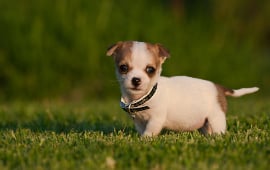You’ve planted your lawn with high quality grass seeds. You’ve watered, fertilized, and mowed it till it looks nearly perfect—and then you start noticing the little “gifts” left behind by a beloved canine. You can hardly blame your pet for having to do its business, and may just be relieved that it’s not in the house! But how do you deal with this nuisance that man’s best friend can produce?
First, why does dog urine affect your grass seed lawn the way it does? The problem is that dog urine has a high concentration of nitrogen, which, when released in a small area, acts as an overdose of fertilizer would on a small patch of lawn: it becomes greener and grows faster than the area surrounding it, or even turns brown with a surrounding greener ring when the nitrogen concentration is too high. Dogs that squat tend to create more spots than dogs that lift their leg, and larger dogs obviously will do more damage than smaller dogs. Regardless, every spot of any size is unsightly in an otherwise evenly green lawn. However, there are many things you can do to help prevent or repair the damage:
- Train your dog to go in a designated area of the grass that isn’t as visible, or in an area covered with mulch.
- After your dog relieves itself, water the area with as soon as possible. This will help dilute the nitrogen and spread it over a larger area.
- Give your dog access to more water, which will help dilute the urine itself. Keep in mind that this may have the disadvantage of increasing the number of times your pet has to “use” the lawn.
- If an area does turn brown, don’t pull it out right away. Try additional watering—it may repair and become green again.
- If the area doesn’t recover, reseed it with new grass seeds.
- A healthy lawn will always be able to recover more quickly—so make sure that you are watering and fertilizing your grass lawn properly! Hot, dry weather makes spots even more damaging.
What about, um, number two? There are some very good reasons why you should never let dog waste stay on your lawn. For one, it is highly acidic and can damage your bluegrass lawn. Don’t think of it as fertilizer! Your dog’s high-protein diet is not grass, so it will not break down to give grass the proper nutrients it needs, like cow manure does. It also could take more than a year to break down. Dog waste also contains several bacteria and parasites that are transferable and harmful to humans. Clean up after your pet as soon as possible, for your lawn’s sake as well as your own.




